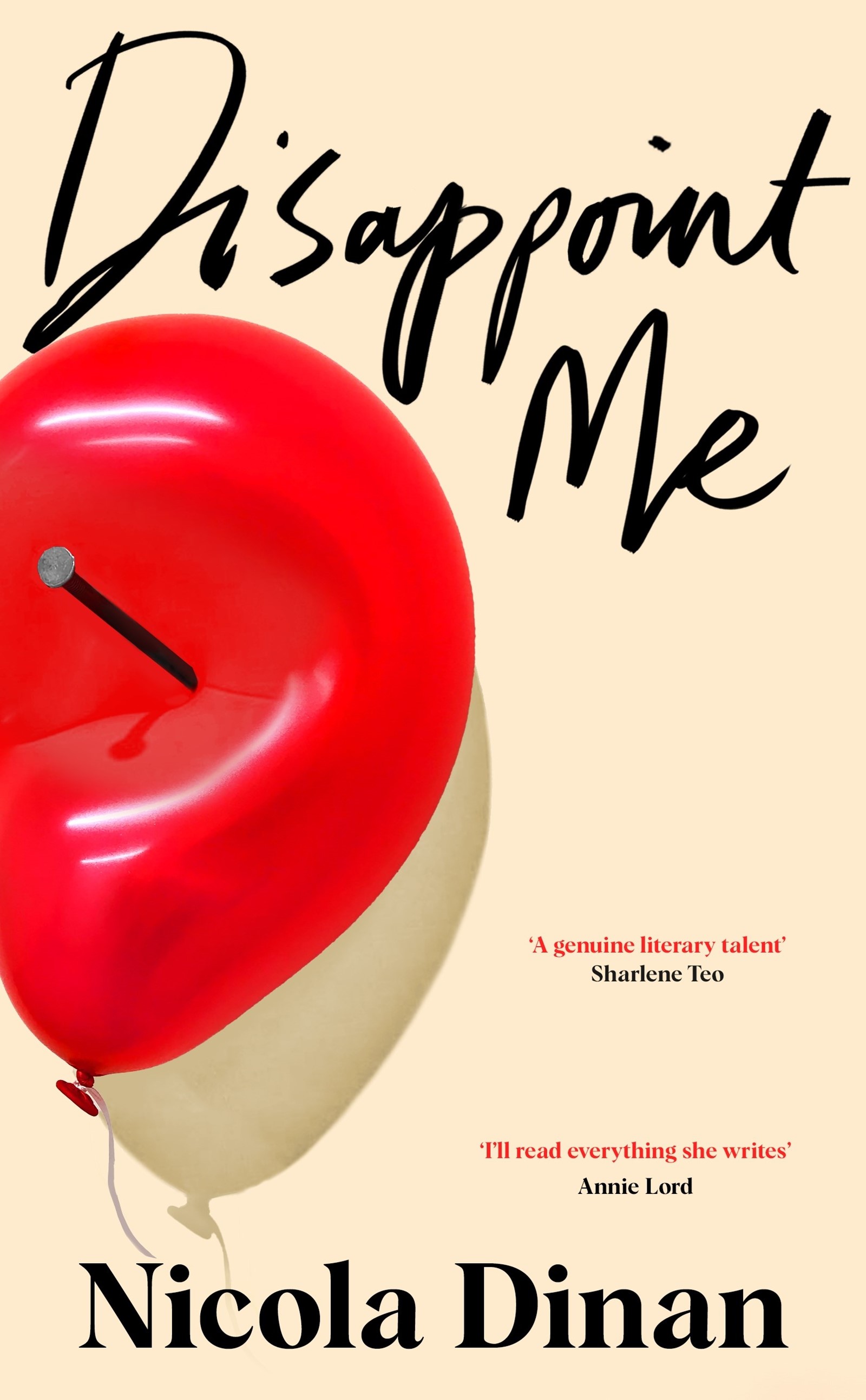“I’ve lost many friends to heteronormativity in the last couple of years. Even queer ones. Engagements. Cardigans. Looking out at the sea while rubbing the outside of their arms.” So says Max, the complicated, vulnerable and intimidatingly astute protagonist of Disappoint Me, the follow-up to Nicola Dinan’s critically acclaimed first novel Bellies.
Max might be young, clever and well-paid but she’s also kind of sad: her new year begins in hospital after falling down a flight of stairs at a party. Not only this, but she’s feeling emotionally bruised after a breakup, while the tricky relationship she has with her father gnaws at her. She questions what her future holds with jaded scepticism. The novel tracks Max’s new relationship with Vincent – a good guy, a catch! – in that he is enlightened, financially solvent, mentally stable, handsome, kind and a lawyer – and Dinan explores to what extent the mistakes from someone’s past should define who they are now.
Moving between Max’s present and Vincent’s past, Dinan skillfully sets the stakes for a shattering reckoning. Throughout the novel, questions around gender and race recur alongside ruminations about what it means to belong, to forgive and to grow. These are big ticket issues but Dinan’s prose is knowing, funny and by turns both cynical and tender.
Below, Nicola Dinan talks more about her writing process and what she hopes readers will take away from Disappoint Me.

Martha Alexander: What prompted you to write Disappoint Me?
Nicola Dinan: I turned 27 and started noticing a shift in energy. People were talking about the future in a way they hadn’t before. Friends’ relationships were getting serious. As a trans woman I wasn’t really sure how I fit into this world. Heteronormativity is something I have felt alienated from. I wanted to write a book which spoke to that tension between the comforts of heteronormativity but also its teeth, why we might not want it. My opinions on the matter shifted in real time as I wrote the novel because I was growing up.
MA: How did you come up with the title Disappoint Me?
ND: I came to the title really quickly. I was thinking about feelings of romantic and interpersonal disappointment and how we can preempt or anticipate disappointment in order to try to lessen the pain of it. Max in many ways spends her life waiting for the other shoe to drop. And if you’re always waiting for the other shoe to drop, it’s going to drop. The title might be sexy but it’s also an invitation by Max for others to disappoint her. She’s trying to immunise herself against disappointment by asking for it. I wanted a title that got to the root of that jadedness which I think many of us move into when we turn 30 and feel isolated and unsure about what life has in store. What happens when your dreams don’t materialise how you wanted to and you have not just gone through one heartbreak but several?
MA: Can you tell me a little about your process? And how do you know when you’ve finished a novel?
ND: I usually know where the start is and roughly the end but I don’t really know what happens in between. I’m not a planner and I never will be. I am not a hugely spontaneous person in my life but I am in my writing. I like to experience a lot of what I’m writing about at the same time as my characters. This means I’m reacting at the same time as they are and really thinking about how I would feel about certain things rather than working from a pre-determined space.
I like deliberately ambiguous endings that don’t spell out what’s in store for the rest of the characters’ lives. There’s a part in Disappoint Me that describes life as a series of happy endings and sad endings. There is no true happy ending. Life continues and happens in sequence and we have all these epochs adjoining one another. There is no promise of future happiness. I write with that in mind, knowing that the characters’ lives will continue after the novel in a way that even as the author I can’t and don’t want to define.
“Heteronormativity is something I have felt alienated from. I wanted to write a book which spoke to that tension” – Nicola Dinan
MA: How has your background in science and law informed your career as a novelist?
ND: In both of those fields you are required to write in a really direct way. I have always aspired to a style of writing that is imaginative but is still clear in the communication of the emotional message. Those years of training and then working as a lawyer honed that. It’s also provided me with a lot of material: I find myself returning to lawyers constantly.
In Disappoint Me, Max and Vincent are both lawyers and Max’s mum was also a lawyer. I’m finishing a third book which is also about lawyers but in the 1980s in Hong Kong. I find myself drawn to aspects of the profession: its rigidity, its promises to those who work in it, the ability it provides to escape. And working in law introduced me to such wild personalities. In the second chapter, Max explains that she switched private practice for a cushier job in a tech firm because she wanted to leave an environment which rewarded undiagnosed personality disorders. This is true to my own experience.
MA: Max’s job, which is essentially pretending to be a robot, is pretty niche. Can you tell me more about what inspired it?
ND: That was a job I did. I reviewed contracts for a company who wanted to make their clients think we had AI. But it was just me, signing off as a robot. I tell people I had this job and they just can’t believe it – one of those moments the truth is stranger than fiction. Of all the things in the book people might assume are based on reality this feels the most fanciful but it’s the one I borrowed most closely from. Science has provided a lot of source material for me.
MA: How much attention do you pay to reviews?
ND: I am almost ashamed to admit that I’ve read my own Goodreads [reviews] for Bellies. I don’t treat [any review] as absolute. I don’t read a bad review and think I need to make changes, it just feels like being part of a literary workshop en masse. There’s sometimes negative criticism that probably speaks to an intuition I’ve already had about my work – and I don’t think that’s a bad thing. I’m still in a place of wanting to grow and develop my voice and style. It doesn’t make sense to me to turn off what people are saying about my novel and sometimes that means seeking broader feedback than just congratulatory reviews of my work.
“What happens when your dreams don’t materialise how you wanted to and you have not just gone through one heartbreak but several?” – Nicola Dinan
MA: Some sections of the media have abhorrent views of trans people. With this in mind, how cautious are you about how you present your trans characters?
ND: I’m kind of repulsed by that notion. I shouldn’t have to characterise trans people as virtuous or shy away from them having nasty thoughts or opinions because that’s denying them their humanity. There’s a line in Disappoint Me that says that “there always comes a time where you can’t deny the bones their flesh” and the reality is that people always grow beyond our initial impressions of them and that depth is not totally defined by good.
I want to offer full and complex characterisations of trans people: I’m not in the business of trying to convince anyone that trans people are deserving of basic human rights. I can’t cater my work to people who don’t have a basic level of empathy for trans people. To write with the goal of converting transphobes feels like a fruitless exercise and too much of a burden. My work is not for them.
MA: What do you hope readers will take away from Disappoint Me?
ND: Change is a huge theme of the novel. I can’t say that I write didactically and I can’t say I have a specific moral point. Rather I hope the work can challenge people’s thinking or preconceptions around the nature of change in others and in ourselves. I always want people to feel. Books are an amazing way to affect an emotional change in the reader. That is the holy grail for me – to encourage people to turn inward and reflect.
Disappoint Me by Nicola Dinan is published by Doubleday, and is out now.
